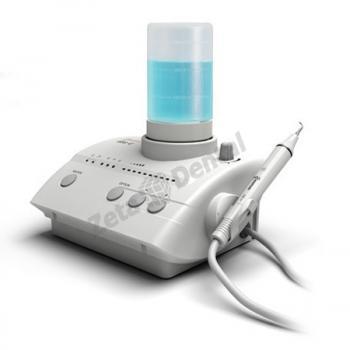Ultrasonic scaler is ultrasonic equipment with a ultrasonic scaler tip for supplying high-frequency vibrations, used to remove plaque and calculus from teeth and bits of inflamed tissue from the walls of the gingival crevice. This dental equipment helps to locate and remove any unpleasant stains and plaque between teeth, the front and backsides of the teeth, and along the gum line.

Periodontal scaling procedures "include the removal of plaque, calculus and stain from the crown and root surfaces of teeth. Root planing is a specialized skill involving scaling of the root of the tooth, made up of cementum. Because cementum is softer than enamel, it is affected more by ongoing build-up and inflammatory byproducts. A smooth cementum provides less opportunity for bacteria to accumulate and form calculus, so root planing is an important part of stopping progression of periodontal disease, especially once deeper pockets have formed in the gums, which is really in the bone. Thus root planing is a specific treatment that removes the roughened cementum and surface dentin that is impregnated with calculus, microorganisms and their toxins.
Scaling and root planing is considered the basic treatment of periodontal diseases and may be the only treatment required to treat mild cases of periodontitis; however, it may also be the initial therapy prior to future surgical needs. For the procedure to be considered effective, the patient must be able to be maintained at a level of periodontal health that will prevent reinfection with periodontal pathogens.[3] This requires optimal home care and ongoing periodontal maintenance therapy, usually every three - four months to sustain health.
It is effective only when certain conditions are fulfilled. A complete removal of calculus from the periodontal pockets using hand and ultrasonic instruments is not totally effective. The depth of the pocket, when identified by the probe, exceeds more than 3mm then calculus removal becomes more insufficient. The maximum access of a probing instrument is up to 6mm, any calculus beyond that can't be reached.[citation needed] If there is calculus exceeding more than 6mm, then scaling and root planing are ineffective and the best treatment option in such cases will be surgical access for complete pathogen and calculus free area.
Examine your teeth to spot stains, and note the areas where scaling will be necessary. These are the areas where stains are present or where flossing has not removed all debris. Use a dental mirror to check the back sides of teeth. Scaling once a month should suffice, but sometimes you may need it up to once a
week, depending on how regularly and properly you brush and floss. If you smoke or regularly consume coffee, tea or red wine, your teeth will require scaling more often.